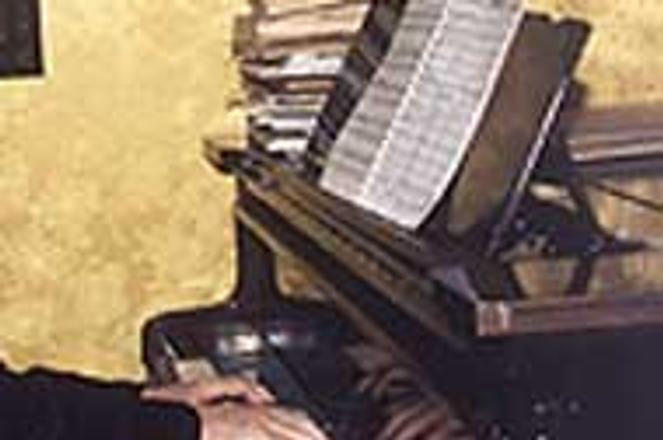The author of the musical score to the Egyptian national anthem, Andrašovan is today working on a children's opera.photo: Courtesy of Tibor Andrašovan
Composer Tibor Andrašovan has been a legendary figure in the Slovak cultural and musical scene for over 50 years. Born in 1917 in eastern Slovakia's Slovenská Ľupča as the youngest of five children, he grew up in Banská Bystrica and later moved to Bratislava before embarking on travels across the globe.
His resumé is remarkable: pianist and conductor for the Slovak National Theatre in Bratislava from 1945 till 1957, co-founder of the Slovak folklore group Sľuk, author of the first Slovak ballet (Orpheus a Eurydice), 6 operas and music scores to 160 Slovak films. He has even composed music for Asian royalty, and in 1957 wrote the musical score for the Egyptian national anthem.
Now 83, Andrašovan still shows no signs of slowing down - he returned from the US in January having conducted one of the opening concerts of a new theatre in New Jersey, and he is also an active free-lance composer currently working on a Slovak opera for children. On February 10, Andrašovan sat down with The Slovak Spectator in Bratislava's Olympia café to reflect upon his eventful life.
"That was at a jubilee concert celebrating Egypt's victory in the [1956] Suez conflict against France and Great Britain," Andrašovan said in reference to his writing of the Egyptian national anthem. "I composed the anthem Allah Akhbar, which was sung by 3,000 soldiers and an orchestra in front of President Nasser and the Egyptian government. They liked it so much that they made it their national anthem."
Adela Grendárová, a former chorus member with the ensemble in Egypt, said the experience was magical. "We choir-girls were in our 20's," she said on March 10 while humming the tune. "I remember how the whole amphitheatre sang with us. I had chills going down my spine."
Before Egypt, Andrašovan had ventured to Asia in 1956 where his ensemble performed in front of the Cambodian King Sihanouk. After performing the king's favourite songs, Andrašovan was awarded the royal title Moni Sarafon, a title that gave him the same stately privileges as a prince.
The next year he spent a season as a conductor in Mongolia, where General Vyacheslav Molotov, who negotiated the World War II non-agression pact between Nazi Germany and the Soviet Union, was serving as Soviet Ambassador at the time. Andrašovan said the two enjoyed playing cards, although he professed that the Soviet statesman usually had the upper hand.
"I always lost," Andrašovan said. "I never had the time to learn to play cards or chess well. I was always busy playing and composing music."
He recalled the moon-crater appearance of the Mongolian landscape and his long talks with Molotov and his wife. "Molotov was very friendly and an excellent violin player," Andrašovan said. "When I was rehearsing Dvořák, he used to comment on how Slavic dances were easy to listen to but difficult to play."
What Andrašovan may be remembered for best is co-founding Sľuk. Established in 1949 with Pavel Tomkovič, Sľuk was the first professional Slovak folklore group and it lives on today, preserving Slovak traditions and folklore.
Andrašovan explained that he and Tomkovič had spent 1949 travelling around Slovakia to find dancers and musicians for their new project. "After World War II there was a great revival of folklore in Slovakia," he said. "We went scouting for local talent and we found it in abundance. We then persuaded them to come to Bratislava, taught them how to read notes, trained them and schooled them."
This they did so well that Sľuk eventually travelled the world, presenting Slovak folklore to every continent but Antarctica. His students and his counterparts said that Andrašovan was perfectly suited for the Sľuk leadership.
"He was able to capture the specific characteristics of regional lore and then develop them with music," said Štefan Nosál, the artistic director and choreographer of the Bratislava-based Slovak dance group Lúčnica.
"He was great to work with," agreed Grendárova. "He was very strict and always demanded great precision from us. Rehearsing with Andrašovan was always very professional."
Teaching dance and song benefited Andrašovan as well, as it helped him find his current wife Mária, 35 years his junior and with whom he now has a daughter studying opera in New York.
"I was very impertinent," Mária said of their first meeting. "I visited him in his home because I wanted to audition for a soloist part in Sľuk. He told me not to leave, that I had a God-given voice and that I needed to study opera. After the second private lesson, he invited me to dinner."
The two have been happily married for 27 years, she said. And although her husband has exhibited a penchant for travel in the past, the couple have no plans of ever emigrating to another country.
"My roots are so strong here they could never be cut off," he said. "I wouldn't be able to feel the ground I'm walking on. No matter what type of government is in place, whether they beat me or lock me up, I'll always remain faithful to my country."


